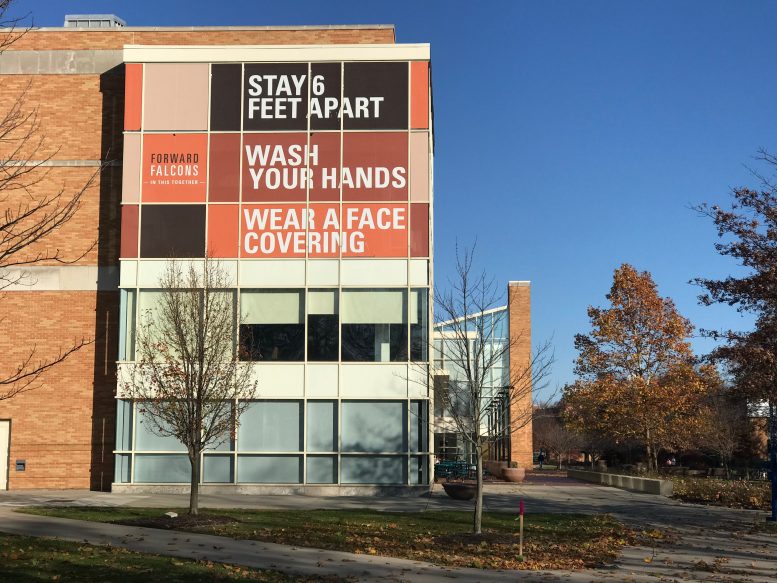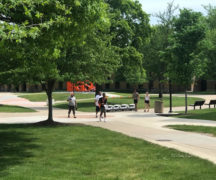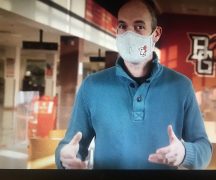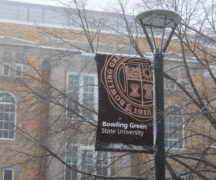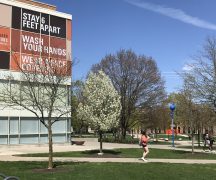By DAVID DUPONT
BG Independent News
Students who violate Bowling Green State University’s COVID-19 protocols, including holding large parties off campus, face university discipline, including suspension.
In the wake of a rash of police responding last weekend to complaints about parties, including a couple with more than 75 attendees, President Rodney Rogers sent a letter to students and parents reiterating BGSU’s tough stance.
“As we unfortunately had to do in the fall,” the letter read, “we will continue to hold students accountable who are found responsible, including suspension measures. Not only do these disappointing events compromise our community’s health and well-being, but they impact our ability to stay open on our campuses.”
Last semester five students were suspended because of COVID-19 violations, according to numbers released by the Dean of Students office. These numbers do not reflect instances from last weekend.
Dean of Students Chris Bullins said that holding students accountable is a crucial part “whenever we’re trying to work with our student body and educate our students about maintaining safety, not just in our learning community but off campus.”
Since last August, 16 students faced disciplinary action for off-campus gatherings.
Three were suspended, and two received deferred suspensions, where they face suspension if they have further disciplinary problems.
Whether a student is suspended is based on the “gravity of the situation” or “because of their prior conduct,” Bullins said.
Suspended students cannot be on campus without making arrangements with the administration and cannot take courses. Also, notation of the suspension becomes part of their permanent records.
The other 11 students disciplined for off-campus parties received lesser sanctions, either conduct probation or warning status.
“There’s a culture of students wanting to host parties,” Bullins said. And now the pandemic with curfew and limited capacity at bars, there are fewer social options.
Bullins said these reports of off-campus gatherings mostly come from law enforcement, either the city police or the university’s own police force. Sometimes though they may be reported by neighbors or other students.
The university also suspended two students for violating the university protocols for on-campus quarantine or isolation.
Students are quarantined if they’ve been exposed to the virus, and students are isolated in campus housing if they have tested positive.
The most severe discipline would be for those students who repeatedly left quarantine or if “a student egregiously left isolation,” Bullins said. That puts others at risk.
Seven students received deferred suspension while six were put on probation and two warned for quarantine and isolation violations.
Most of the violations involve residential students violations of the Forward Falcon commitment all students have to sign.
While some of these may relate to complaints by faculty, Bullins said 90-95 percent involve students in residence halls.
Since the beginning of the fall 2020 semester, 620 students have been cited, but 75 percent of those were the lowest form of discipline, a letter sent to students to remind them of the community standards.
Even if a student is stopped by a resident advisor for not having a mask on, and they immediately put one on, the administration asks for a report and sends a letter to students. Bullins said it’s important for the administration to keep track of all such infractions.
Five students did receive deferred suspensions for Forward Falcon violations.
Bullins said with fewer students living on campus, and many students taking some form of remote instruction, other disciplinary issues are down. That enables his office “to adjudicate” COVID-19 replated problems “in timely manner.”
“I can appreciate that students are experiencing COVID fatigue,” Bullins said, “but the vast majority are doing the right thing.”
Rogers’ letter concluded: “We are so close to overcoming this crisis, and we ask that you do not give up now. The COVID-19 vaccine distribution continues to ramp up, and we must remain resilient. To the majority of our community members who continue to make the right decisions, we are most grateful.”

